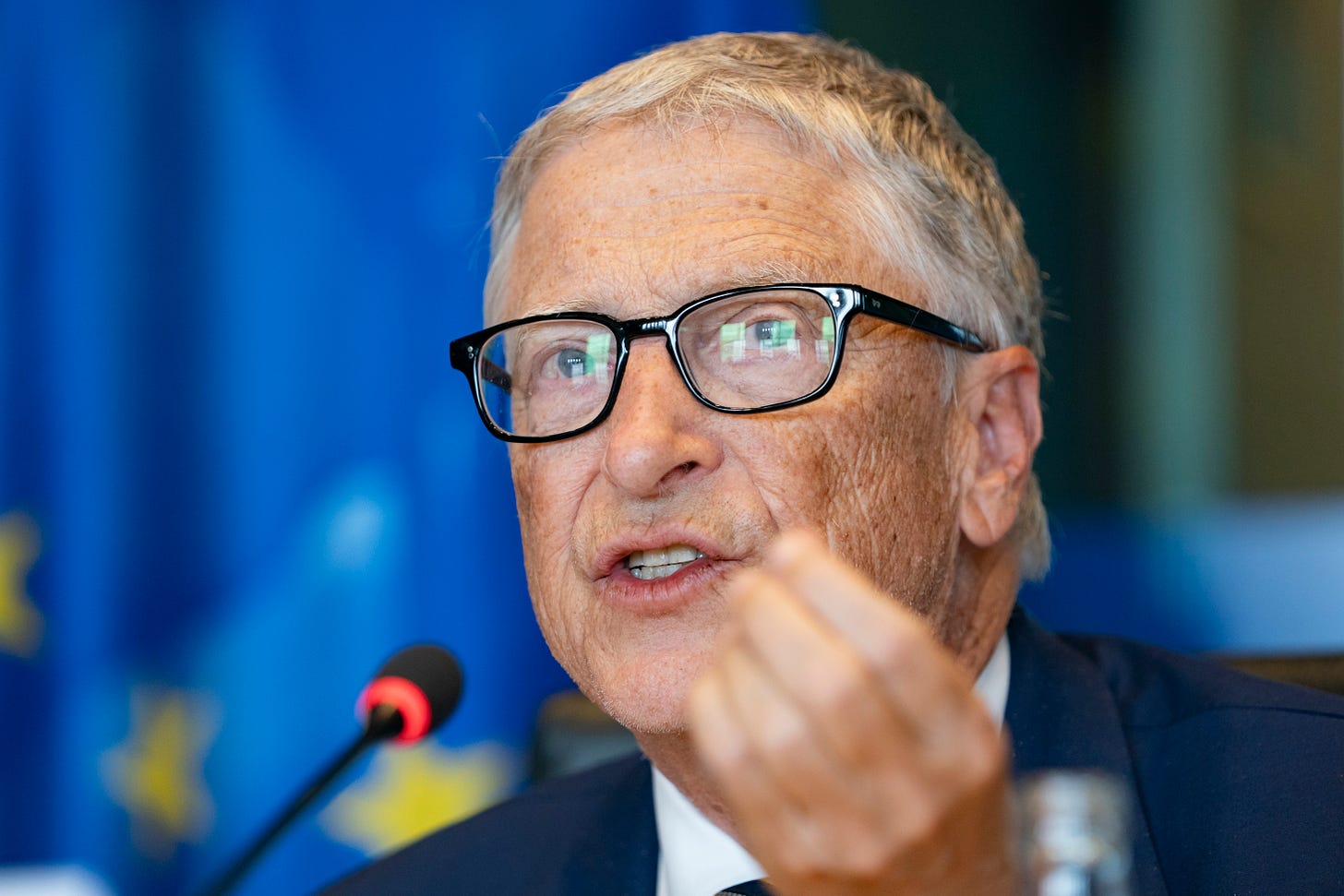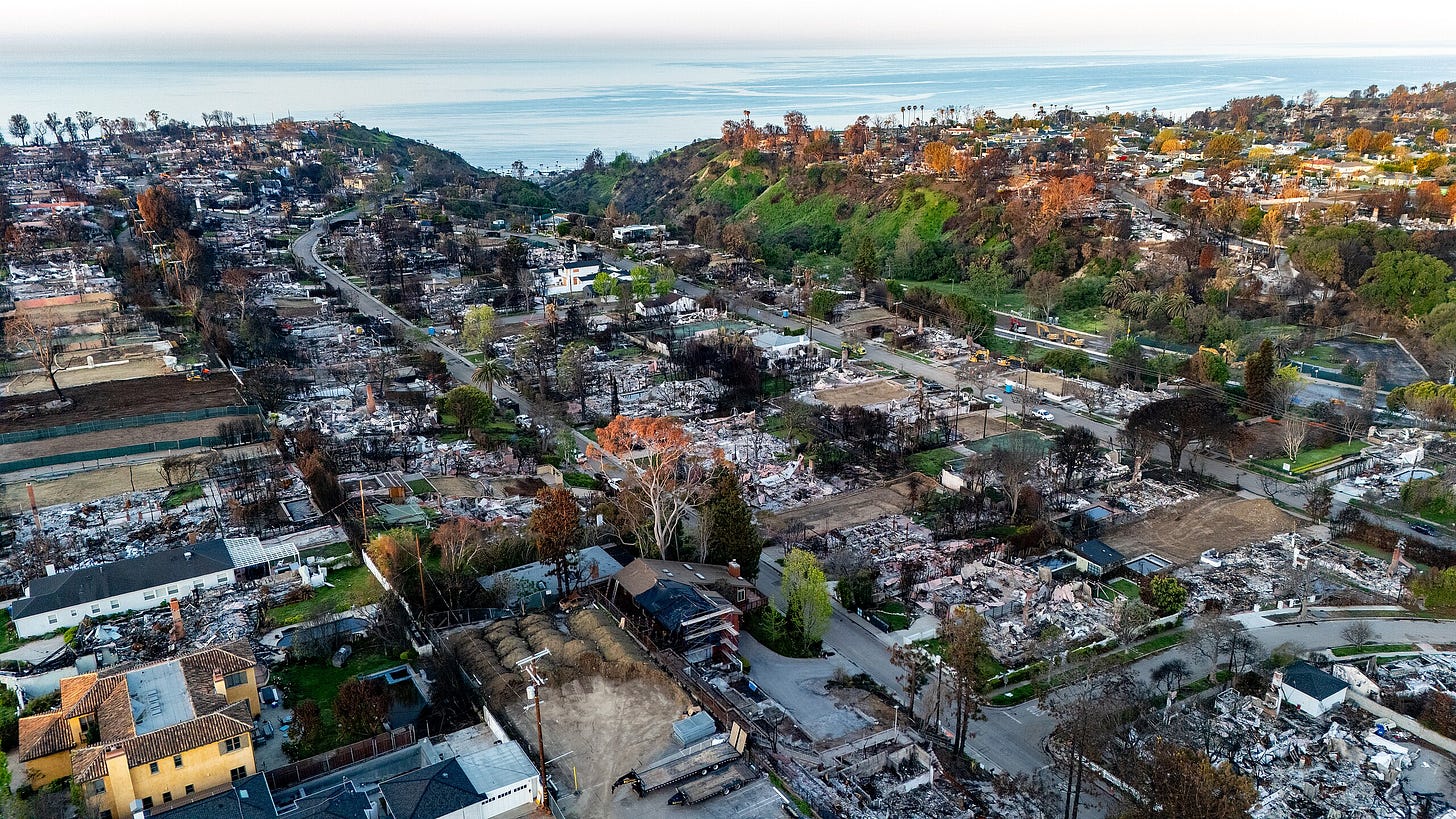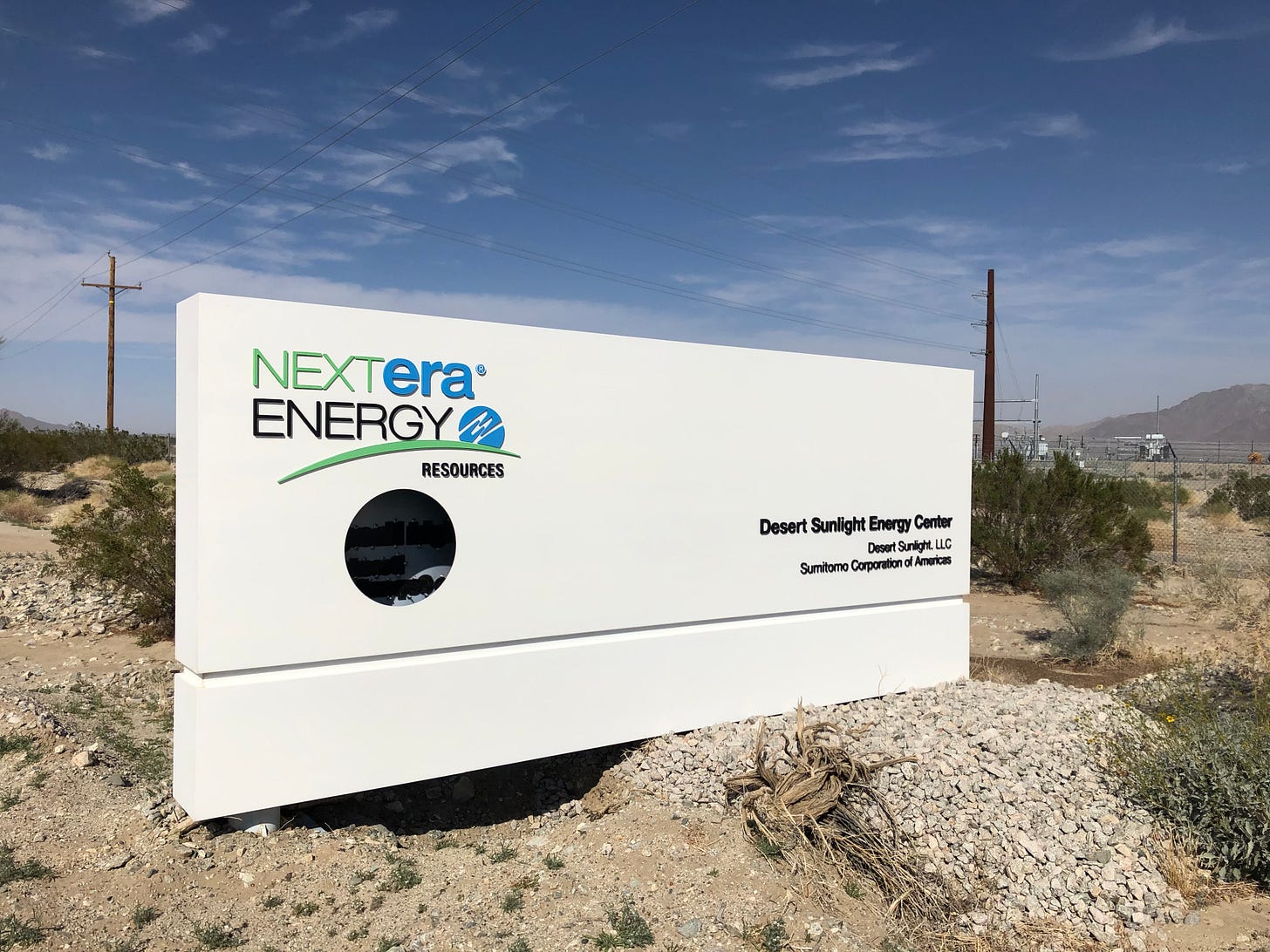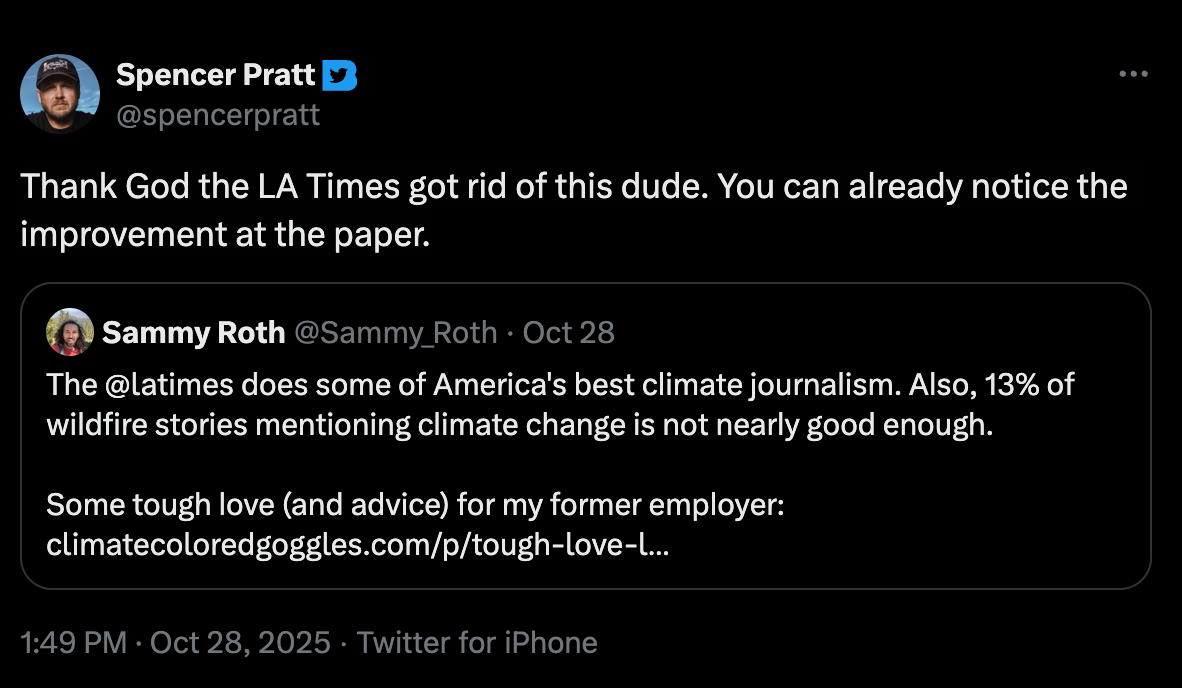News roundup: The Gates of Doom
Climate scientists take Bill Gates to task. Plus, assigning blame after a devastating fire.
“You looked into my eyes. Your path now leads to the Gates of Doom!” — Mara, Indiana Jones Adventure (Disneyland)

First off, thank you to everyone who joined last week’s virtual event, where I talked with four leading climate scientists about Bill Gates’ controversial climate memo. If you couldn’t make it, the full video is here.
Rather than summarize the entire discussion, I’ll share a few useful quotes — starting with this one from Texas Tech’s Katharine Hayhoe:
“[Gates] talks about how climate change will affect people who are poor, but it won’t be the worst thing that affects them; there will be other things like hunger and poverty. Well, how does climate change affect us? It affects us by making hunger and poverty worse. They are not separate problems. They are problems that are being exacerbated by this very issue. So we’re not talking about humans becoming extinct, but we are talking about massive suffering, including loss of life, as well as livelihoods, homes and more. And that suffering increases degree by degree.”
Brown University’s Kim Cobb built on that theme, highlighting the many connections between fossil fuels combustion and public health:
“The suffering that’s going to pile on, that we’ve known about for decades, is going to pile on to the global poor. And that happens at every scale, in every geography… I find it just grossly ironic that the release of this memo occurred right on the heels of this catastrophic hurricane that we had down in the Caribbean, Hurricane Melissa… Continued dependence on fossil fuels is an incredibly huge threat to global health everywhere. As we think about the weight of our climate futures, we have to bring that into the conversation.”
Daniel Swain, from the University of California system, expressed frustration with Gates for implying that current warming projections are not so bad:
“A two-and-a-half to 3 degree warmer world — it is a catastrophe, not just for people who live in the Global South, not just for poorer nations, but also for wealthy nations… I mean, a 3 degree warmer world, just to give a few specific, tangible pictures of what that looks like: That’s a world where the sea level is [several] feet higher than it currently is today, where global megacities that are within a few feet of sea level, their viability is seriously threatened. This is a world where we see widespread, frequent occurrence of historically unprecedented flood and drought events. It’s a world where we lose almost all of the mountain glaciers, and we start to see massive destabilization of the Greenland and West Antarctic ice sheets. And that’s just a short list.”
Last but not least, Berkeley Earth’s Zeke Hausfather challenged one of Gates’ core arguments — that if rich nations spend less money helping poor nations cut climate pollution, more money will be available to fight poverty and disease:
“We don’t necessarily live in a zero-sum world. Most of the money the world is spending on climate change — and the world spent about $2 trillion on clean energy last year — is building and buying clean energy solutions in middle-income or upper-middle-income countries. And so it’s not like if the Trump administration cut spending on renewable energy, they’re suddenly going to start sending a lot more money to USAID, right? If we wanted to deal with both of these things, there are plenty of resources to do so. It’s fundamentally a policy problem, not a resource problem.”
Again, the full video is here.
Is that all there is to a fire?

It’s been clear for months that the Eaton fire — one of two deadly infernos to torment Los Angeles County in 2025 — was probably sparked by a Southern California Edison power line.
Now we have an alleged ignition source for the Palisades fire.
After a lengthy investigation, a grand jury has charged a 29-year-old former Pacific Palisades resident with arson. Investigators say he started a fire originally known as the Lachman fire early on New Year’s Day. In theory the blaze was fully extinguished by firefighters, but in fact it was still smoldering underground. Eventually the flames roared back to the surface amid blistering winds, becoming the Palisades fire. It killed a dozen people and destroyed thousands of homes.
I’ve been hearing from social media trolls about what an idiot I am for continuing to link the Palisades fire to climate change, when this latest development clearly proves that an arsonist is to blame, not my silly global warming obsession.
Or, alternately, that government is to blame, because — as my former L.A. Times colleagues Paul Pringle and Alene Tchekmedyian reported, in a legitimately startling scoop — some of the firefighters mopping up the Lachman fire were ordered to leave the burn site even though they could tell the ground was still smoldering.
When I read that story, I thought: Wow! It sounds like the L.A. Fire Department may have really screwed up.
I also thought: The trolls are going to eat this up.
Specifically, I thought back to a social media post from reality TV star Spencer Pratt, who lost his home in the Palisades fire and has become a leading critic of the city’s response, appearing alongside Republican senators on Capitol Hill. After I posted on X that only a small percentage of L.A. Times stories about the fires had mentioned climate change, Pratt shot back: “Thank God the LA Times got rid of this dude. You can already notice the improvement at the paper.”
Here’s the thing about the climate crisis: It’s big and all-consuming and difficult to wrap your mind around. Most Angelenos — most Californians, most people in most places, even those of us who understand that the planet is heating up and that fossil fuels are largely responsible — still exist in a collective state of denial. When disaster inevitably strikes, it’s easy to blame an (alleged) arsonist or an (alleged) government failure. It’s extremely difficult to grapple with the reality that oil and gas are adding fuel to the fire, and that it’s incumbent on us to respond accordingly.
Yes, arsonists should go to jail. Yes, government agencies that did their jobs poorly should be held accountable.
And also, we need to focus our attention on larger systemic malefactors. Like the long history of fire suppression that has primed much of California for devastation. And the fact that L.A. was built to burn, in terms of poorly located development.
And yes, the climate crisis.
In practice, that means calling out the oil giants whose products are overwhelmingly responsible for rising temperatures and drying landscapes: ExxonMobil. Chevron. BP. Shell. Various others. Right now, you’ll rarely hear them mentioned in news stories or political debates or social media dialogue about wildfires.
They’d surely prefer to keep it that way. Exhibit A: Last month, Exxon sued California over a law requiring big companies to disclose how much climate pollution they emit. Exxon claimed the law violates its free speech rights.
I’m certainly not a lawyer, so I can’t comment on the legal merits. But I’m guessing Exxon doesn’t want to reveal emissions data that could attract negative attention and spur calls for accountability. California lawmakers have already tried to pass a “Make Polluters Pay” bill to hold fossil fuel companies financially liable for climate damages — only to fail in the face of oil industry opposition.
If Exxon and other oil giants are required to report their emissions, it will be easier to name and shame them after the next disaster. “Polluters Pay” might pass.
So I’m glad the person who (allegedly) started the Eaton fire was was caught. I’m glad the agencies that (allegedly) screwed up are being taken to task.
But let’s resist the urge to make that the end of the story.
In other news
Political climate:
Democrats won key elections in Georgia, New Jersey and Virginia after running campaigns tying Republicans to high electricity rates — and naming renewable energy as a solution. (Hayley Smith, L.A. Times)
The Georgia Public Service Commission elections are especially notable because they could lead to more renewables and lower electric bills in the Peach State. I’m guessing all the Hollywood studios that film in Georgia were watching this one? (David W. Chen, New York Times)
The donors for President Trump’s fancy White House ballroom include NextEra Energy (the nation’s largest renewable energy developer), as well as entertainment industry heavyweights Amazon, Apple and Comcast. (PBS)

Renewable energy:
We’ve already figured out how to graze sheep at solar farms. Maybe solar panels and cows can coexist too. (Dan Gearino, Inside Climate News)
Could wind turbines off the California coast kill bats? Researchers were studying this until Trump yanked their funding. (Clare Fieseler, Canary Media)
Geothermal energy developer Ormat is suing the federal government to undo a Biden-era endangered species listing that could prevent it from building a power plant in Nevada. (Amy Alonzo, the Nevada Independent)
Less-than-renewable energy:
Los Angeles will convert its largest gas-fired power plant to green hydrogen — whenever green hydrogen is available. In the meantime, the plant will most likely burn lots of fossil gas. (Hayley Smith, L.A. Times)
Oil companies Phillips 66 and Kinder Morgan want to make up for refinery closures in California by building a new pipeline to move fuel west from Texas. (Sumit Saha and Shariq Khan, Reuters)
Does anyone want to drill in the Arctic National Wildlife Refuge? Thanks to Trump, we may yet find out. (Maxine Joselow, New York Times)
Water in the West:
Los Angeles plans to stop importing water from the Mono Lake watershed by doubling the size of a wastewater recycling project in the San Fernando Valley. That is a very big deal. (Ian James, Los Angeles Times)
Old uranium mines are gearing back up to supply expected new nuclear reactors, with potential downstream consequences for groundwater supplies. (Jake Bolster, Dylan Baddour and Wyatt Myskow, Inside Climate News)
Arizona has paused development of hundreds of thousands of new homes due to insufficient groundwater supplies. (Tony Davis, High Country News)
Climate disasters:
How did global warming turn Hurricane Melissa into a supercharged monster? Scientists explain. (Andrew Freedman, CNN)
The rate of heat-related deaths has risen 23% globally since the 1990s. (Damian Carrington, the Guardian)
A violent typhoon forced 1,500 people to flee their villages on the Alaskan tundra. (Kiley Price, Inside Climate News)
I admire artists who grapple with climate. I wish I could get to Alaska (or Oregon or Michigan) to see this exhibit on melting permafrost, which features paintings, poetry and scientific field notes (story by Adam Popescu, New York Times).
Two podcast recommendations:
Smoglandia: A masterful history of Los Angeles’ war against smog, and why it’s newly relevant as President Trump attacks clean air rules. Hosted by my former L.A. Times colleague Patt Morrison.
Carbon Bros: A fascinating, mind-expanding look at the overlap between toxic masculinity and climate denial, especially as it’s playing out in podcasting world. Hosted by Amy Westervelt and Daniel Waite Penny for Drilled.
Last but not least, 23-year-old pop superstar Billie Eilish will donate $11.5 million to food equity and climate justice groups, IQ’s Hanna Ellington reports. More celebrities should do this!




Thanks for bringing the Canary Media story about loss of bat tracking funding to my attention. I've been writing about bat and bird tracking for two years, https://www.sanluisobispo.com/news/local/environment/article282796908.html?giftCode=3a3551d9ebf5b84179376835d64ea1127543b6336b4d697877f8d76bfd609baa and https://www.sanluisobispo.com/news/local/environment/article311993028.html?giftCode=65797e6c6c1363bbae6451dae5d5159a12e36156222b6e7d6bc1eb42a3e071b8
The government shutdown made connecting difficult. I hope to update the Piedras Blancas project soon.
I wish more SoCal people understood the wildfire danger in the combination of wildly under-maintained public land and public utilities, *and*, having a high-wind season follow a no-rain winter.
Another gloomy wildfire recommendation from our northern forest neighbors: https://fresnoland.org/2025/10/14/garnet-fire/
http://www.hurteaulab.org/blog/a-eulogy-for-teakettle